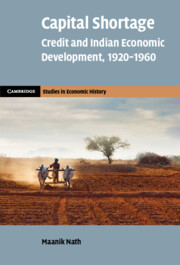Book contents
- Capital Shortage
- Cambridge Studies in Economic History
- Capital Shortage
- Copyright page
- Contents
- Figures
- Tables
- Acknowledgments
- 1 Introduction
- 2 Agriculture, Commerce and Governance in the Longue Durée
- 3 Climate and Credit
- 4 Courts and Credit
- 5 Regulating Moneylenders
- 6 Regulating Cooperatives
- 7 Credit after 1960
- 8 Conclusion
- Epilogue
- Bibliography
- Index
6 - Regulating Cooperatives
Published online by Cambridge University Press: 08 September 2023
- Capital Shortage
- Cambridge Studies in Economic History
- Capital Shortage
- Copyright page
- Contents
- Figures
- Tables
- Acknowledgments
- 1 Introduction
- 2 Agriculture, Commerce and Governance in the Longue Durée
- 3 Climate and Credit
- 4 Courts and Credit
- 5 Regulating Moneylenders
- 6 Regulating Cooperatives
- 7 Credit after 1960
- 8 Conclusion
- Epilogue
- Bibliography
- Index
Summary
Summary: Policies targeted at disciplining moneylenders was one approach to dealing with the problem of limited supply and high prices; the other was establishing alternative sources of affordable credit. Following rounds of discussion among colonial officials in the late nineteenth century on the type of credit supplier most suited to cater to demand in rural India, the government embarked on an ambitious project to transplant credit cooperatives as designed in Europe to Indian villages in 1904. The chapter explores the phase of transplant and how the cooperative enterprise in India differed from the European model. It examines how cooperatives performed, evaluates profit and loss statements and analyses whether expansion in the number of cooperatives led to inclusive development. The chapter finds negative outcomes in each measure. Prevailing political objectives prioritizing equity over efficiency led to a cooperative structure operating with low savings and weak regulation. The regulatory problem ultimately led to the exclusion of poorer peasants from accessing credit and overleveraged cooperative banks. Injections of public money into rural cooperatives embedded moral hazard in the sector. These problems became more severe in the 1940s and 1950s.
Keywords
- Type
- Chapter
- Information
- Capital ShortageCredit and Indian Economic Development, 1920–1960, pp. 150 - 182Publisher: Cambridge University PressPrint publication year: 2023



